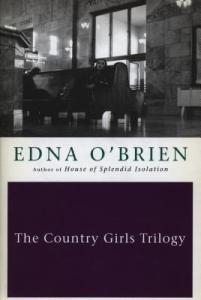 Reading an acclaimed, established author’s early works is usually an interesting and informative process. From a writer’s perspective, it’s helpful to see how other writers develop their skill. Reading a writer’s first novels through the lens of their later books also helps to illuminate the issues at the core of their work; it shows what makes them tick.
Reading an acclaimed, established author’s early works is usually an interesting and informative process. From a writer’s perspective, it’s helpful to see how other writers develop their skill. Reading a writer’s first novels through the lens of their later books also helps to illuminate the issues at the core of their work; it shows what makes them tick.
That said, I really didn’t enjoy reading O’Brien’s The Country Girls Trilogy. O’Brien is an Irish-born writer who now lives in London, and these books were important when they were published in the early 1960s. In fact, the books caused an uproar at the time, were banned, and even burned. In many ways, their protagonist is a stand-in for the changes that Ireland itself underwent as a country: The provincial, rural, and religious becomes sophisticated, urban, and secular. What’s more: O’Brien wrote about the feelings of women, the tedium of their lives, their desires and disappointments, and she wrote frankly about sex in a way that hadn’t yet been done.
But, ugh.
The two main characters, Caithleen and Baba, are friends from childhood through marriage and into adulthood beyond. They are women that you can identify with and at the same time would like to shake, even as they themselves recognize — and are impatient with — their own shortcomings and the shortcomings of everyone around them.
The work is hyper-realist, and it reads like autobiography (and the first book, The Country Girl, is memoir). In the last book, where there are interesting shifts in narration and perspective, you can begin to see O’Brien’s skill and technique developing. There is humor — much humor — within the pages, and there is also the lovely story of enduring friendship. However, the friendship plays the supporting role in the story, as it does in the characters’ lives, rather than taking center stage.
On center stage is the relentless dependency on men that perhaps was characteristic and telling of the culture and era in which these books were written; nonetheless, it got on my nerves. Nor do I buy that this is a universal female story. We all know timeless examples of strong, resilient, independent women. (And there are many books that tell their stories, though the fact that none spring to mind is worrisome and should be the topic of another essay. Examples? Someone, anyone, quick!)
Here, we have Caithleen aka Kate, the protagonist, presented as a smart and clever girl who won a scholarship, yet she throws her life away completely for one smarmy man after another. And perhaps the reason why the story irritated me so much is because, despite all the social changes and progress we have made culturally in the west, this is a true story that endures too often.
“Is he outside?” I asked…
“Where is he?” I asked.
She looked at me squarely for a second and then said, “He’s gone home.”
“Without me?” I was shocked. “Isn’t he coming for me?”
“No,” she said, sighing, “he’s not coming for you.”
So, if 530 pages of women making bad choices is your thing: read the trilogy. My recommendation, however, is stick to O’Brien’s later works such as The Light of Evening, which is a beautiful meditation on mothers and daughters, or Wild Decembers, which looks at unfair gender relations among siblings and women’s rights—and the lack thereof—in a way that is lovely and wise, rather than cloying and fraught.
